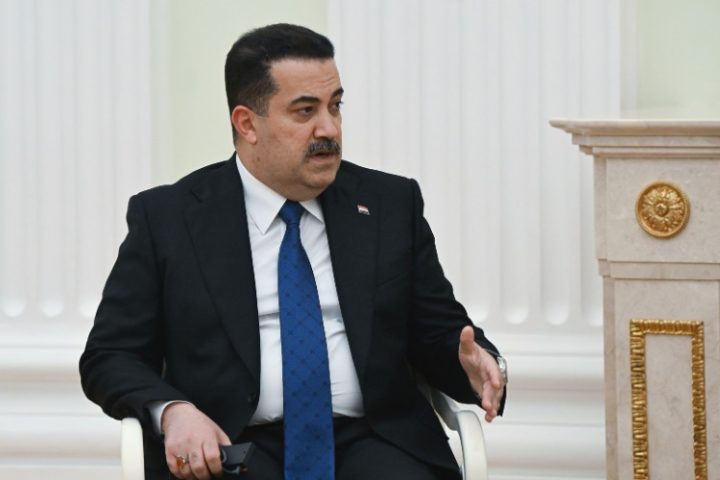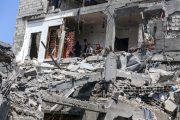
On October 21, Iraqi Prime Minister Mohammed Shia al-Sudani reportedly cautioned that supplies of Middle East oil to international markets could be thrown into disarray if the war between Israel and Hamas intensifies to the brink of dragging other regional countries in.
The conflict would “impact global security, escalate regional conflict, jeopardize energy supplies, exacerbate economic crises, and invite further conflicts,” the Associated Press quoted al-Sudani as declaring at a peace summit in Cairo.
Al-Sudani urged for an immediate ceasefire and a prisoner exchange to bring an end to the fighting. Furthermore, he opposed evacuating civilians out of Gaza amid Israeli bombing, saying, “the Palestinians have no other place but their land.”
The Iraqi prime minister suggested that the crisis could have been avoided if UN Security Council resolutions against Israel’s settlement policies in Palestinian territory had been adhered to.
Hamas has dominated Gaza since 2006, and no new elections have been conducted in the territory since then.
Al-Sudani’s remarks came in wake of fears that Middle Eastern countries could cut off oil exports to the West in retaliation for an Israeli ground offensive into Gaza. Iranian Foreign Minister Hossein Amir-Abdollahian roiled energy markets on October 18 when he called for Muslim countries to enforce an “immediate and complete” oil embargo on Israel.
The 1973 Arab oil embargo against the United States and other countries that backed Israel caused long lines at gas pumps and had deleterious economic consequences. Nonetheless, only about 12 percent of U.S. crude imports hailed from the Middle East in 2022, a great reduction from around 85 percent in the 1970s.
International oil markets remain volatile, with the Israel-Hamas war further increasing prices, “which is definitely bad news for inflation,” International Energy Agency executive director Fatih Birol told AP. Developing countries that depend on imported crude and oil products would suffer the most, he said.
Hamas is backed by Iran, the world’s eighth-largest oil producer. Even without backing from other major exporters for an embargo, Tehran can greatly disrupt markets. Around one-third of the world’s seaborne oil shipments go through the Strait of Hormuz, which links the Persian Gulf to the Gulf of Oman and the Arabian Sea.
On October 18, global oil prices already saw a steep rise amid fears that the Israeli-Hamas war could spill over to other regional countries in the Middle East, leading to global oil-supply disruptions.
Markets across the world took into account risk premiums after explosion at a hospital in Gaza City allegedly killed hundreds of civilians, including doctors, patients, and people taking refuge. Both Israel and Hamas have assigned blame to each other for the incident.
Besides geopolitical tensions, oil prices rose higher due to other reasons, including U.S. crude stocks fallling by nearly 4.4 million barrels in the week ended October 13, much steeper than the 300,000 barrel drop that analysts had predicted.
On October 15, U.S. Senator Lindsey Graham (R-S.C.) added fuel to the fire, warning Iran that the U.S. military could strike its oil industry should any conflict intensify in the Middle East. The lawmaker said he would propose a resolution to this effect, illustrating fears that the Tehran-backed Hezbollah could participate in the fighting between Israel and Hamas.
Appearing on NBC’s Meet the Press, Graham castigated Hezbollah as a “proxy of Iran” and alleged that a “massive attack on Israel” by the Lebanon-based militant group would pose an “existential” threat to the former.
Graham warned that he could introduce a resolution in the Senate “to allow military action by the United States in conjunction with Israel to knock Iran out of the oil business.”
“Iran, if you escalate this war, we’re coming for you,” Graham warned.
Appearing on Al Jazeera, Iranian Foreign Minister Hossein Amir-Abdollahian cautioned that “it is highly probable that many other fronts will be opened” unless Israel stops attacking Gaza. Amir-Abdollahian also called on Muslim nations to back the Palestinian cause, reinforcing earlier calls by Iranian President Ebrahim Raisi and Supreme Leader Ayatollah Ali Khamenei.
Previously, Amir-Abdollahian indicated that Hezbollah could target northern Israel, leading to a “huge earthquake.” Based on two diplomatic sources cited by Axios, Iran would take action if Israel proceeds with a ground offensive in Gaza.
However, Reuters also quoted Iranian representatives at the UN as clarifying that “Iran’s armed forces will not engage” unless directly targeted by Israel first.
U.S. Defense Secretary Lloyd Austin hitherto revealed the mobilization of the USS Dwight D. Eisenhower as well as two guided-missile destroyers and a guided-missile cruiser to the Red Sea, in addition to the USS Gerald R. Ford carrier strike group already in the Eastern Mediterranean.
Austin explained that the move was meant to deter “any state or non-state actor seeking to escalate this war.”
On October 23, the Wall Street Journal reported that the Israel-Hamas war has supposedly created a chance for U.S. weapons producers to manufacture missiles for West Jerusalem’s Iron Dome defense system.
Israeli stockpiles of Iron Dome munitions have been dwindling as Hamas and Hezbollah fire hundreds of rockets every day, rekindling American interests in increasing production, the WSJ report read, citing unnamed U.S. Army and industry officials. The newspaper said that although a U.S. production line would help Israel replenish its stock for future conflicts, it would take months to begin.
The Iron Dome is the final layer of defense in Israel’s three-tiered system for downing projectiles, drones, and enemy aircraft. The Israeli-developed system and its Tamir interceptor missiles have been constructed mainly with Pentagon funding under an arrangement between Israel-based Rafael Advanced Defense Systems U.S. defense contractor RTX Corp.
RTX’s Raytheon Technologies unit already produces around 70 percent of parts for the Tamir in Arizona, and the companies published plans in 2020 to construct a new U.S. factory to assemble the interceptor missiles. Nonetheless, the plant did not proceed after the U.S. Army in 2021 opted for a U.S.-developed missile defense system instead of the Iron Dome. The rival system was reportedly regarded as a superior fit for potential conflicts in Asia-Pacific, where it would have to intercept faster missiles over longer distances.



